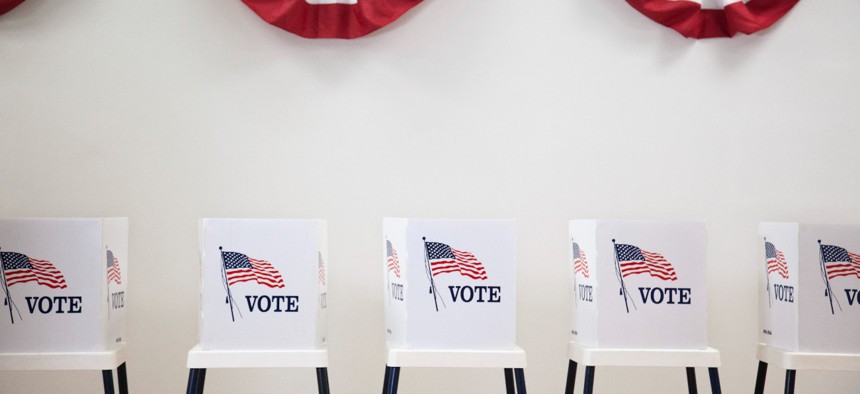
Hill Street Studios / Getty Images
It Just Got Easier for Feds to Vote and Work at Polls
New leave guidance is part of the Biden administration’s overall efforts to increase access to voting.
The White House announced on Thursday expanded leave options for federal employees to vote and work at the polls.
The announcement follows President Biden’s executive order from March 2021 aimed at increasing access to voting. In new guidance, the Office of Personnel Management said that federal employees can receive up to four hours of administrative leave to vote in federal, state, local, tribal and territorial elections, which can be used on election day or for early voting. Also, federal employees may use up to four hours of administrative leave per year to work as non-partisan poll workers or observers.
“Today’s guidance advances fundamental goals of the Biden-Harris administration: to promote democracy, reduce barriers to voting for federal employees, and further position the federal government as a model employer for other employers to follow,” said Kiran Ahuja, OPM director. “OPM is proud to help lead this effort.”
The new guidance goes beyond previous accommodations and leave options OPM has offered in the past for voting and individuals serving as non-partisan election officials, such as it doesn’t just allow time off on election day itself and allows leave rather than excused absences for election officials. Ahuja noted in the guidance that more and more private companies have started giving their employees time off to vote in recent years.
The American Federation of Government Employees applauded the move.
“One of the most effective ways to strengthen our democracy is by ensuring more Americans have the opportunity to participate and make their voice heard,” said Everett Kelley, national president of the union, in a statement. “Instructing agencies to provide leave for voting will not only directly help more Americans play a part in our democracy, it will once again showcase the power of the federal government as a model employer – encouraging other employers in the public and private sector to follow suit and ensure no working American ever has to choose between a paycheck and their right to vote.”
Related, also on Thursday, the White House released a report by the Interagency Steering Group on Native American Voting Rights, created by the March 2021 executive order, that outlines the barriers Native communities face in voting and gives recommendations for policymakers and federal agencies.
Many of the recommendations are for the U.S. Postal Service. For example, “on Tribal areas [USPS] should offer federal voter registration forms in retail offices and should consider whether the retail postal space on or near Tribal lands could be used as satellite polling places without compromising postal operations,” said the report.
For agencies overall, those “with significant presence serving Native communities should expeditiously offer their programs for state designation under the National Voter Registration Act—and state officials should accept those requests for designation.”
The White House noted on Thursday it has repeatedly called on the Senate to pass the Freedom to Vote Act and the John Lewis Voting Rights Advancement Act, which has been stalled for months. In January, President Biden gave his strongest endorsement to date to the Senate changing its rules on the filibuster to pass the voting rights bills, which several moderate Democratic senators have opposed.
“Congress still has the responsibility to act, but the president is committed to using every tool at his disposal to protect the sacred right to vote,” said the White House.
Newsweek reported earlier this month that voting rights advocates were “frustrated” that there weren’t significant mentions of voting rights during Biden’s first State of the Union address. This was not the first time over the last year activists have argued the administration has not done enough on the issue.
In 2021, at least 19 states passed 34 laws restricting access to voting, according to the Brennan Center for Justice, which expects that momentum to continue.
NEXT STORY: GovExec Daily: Government Trends for 2022







